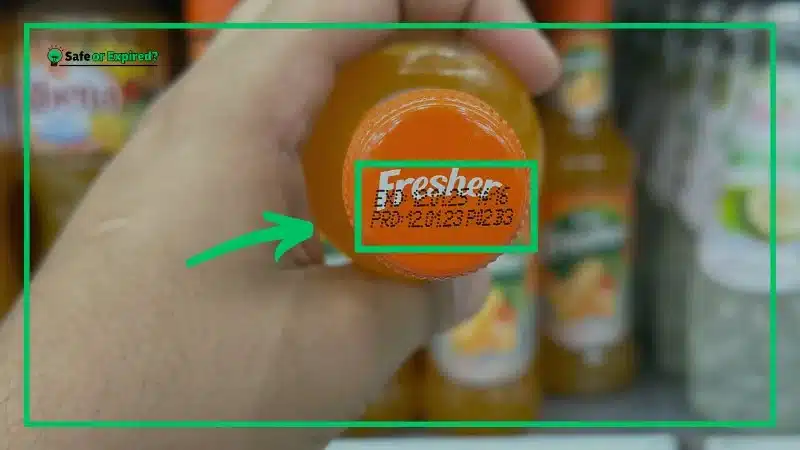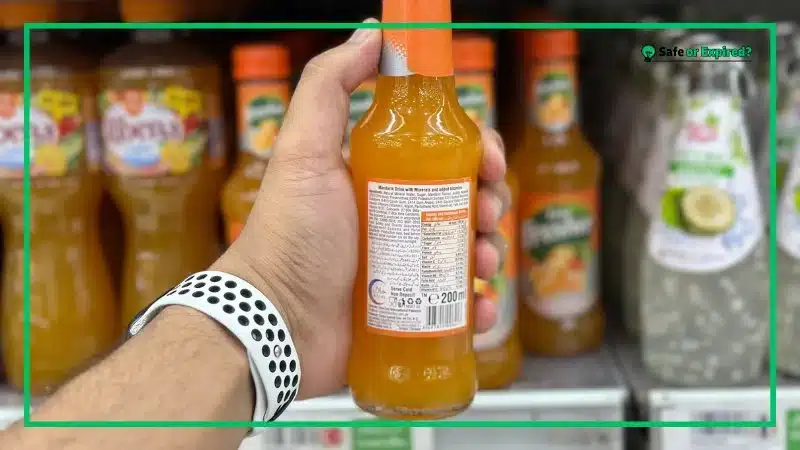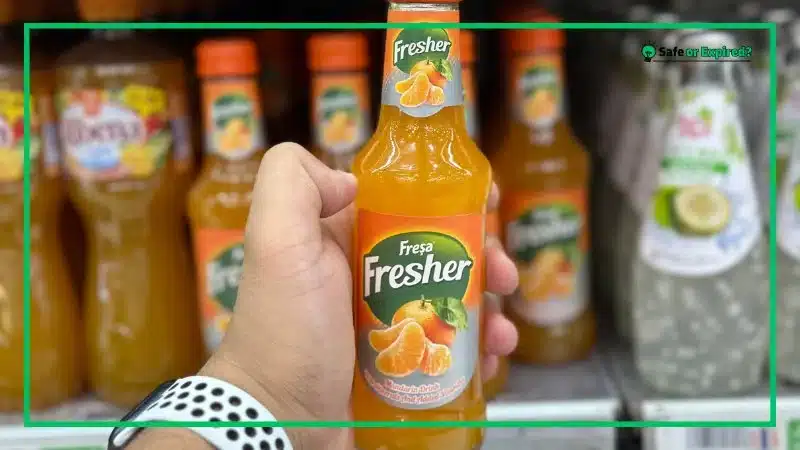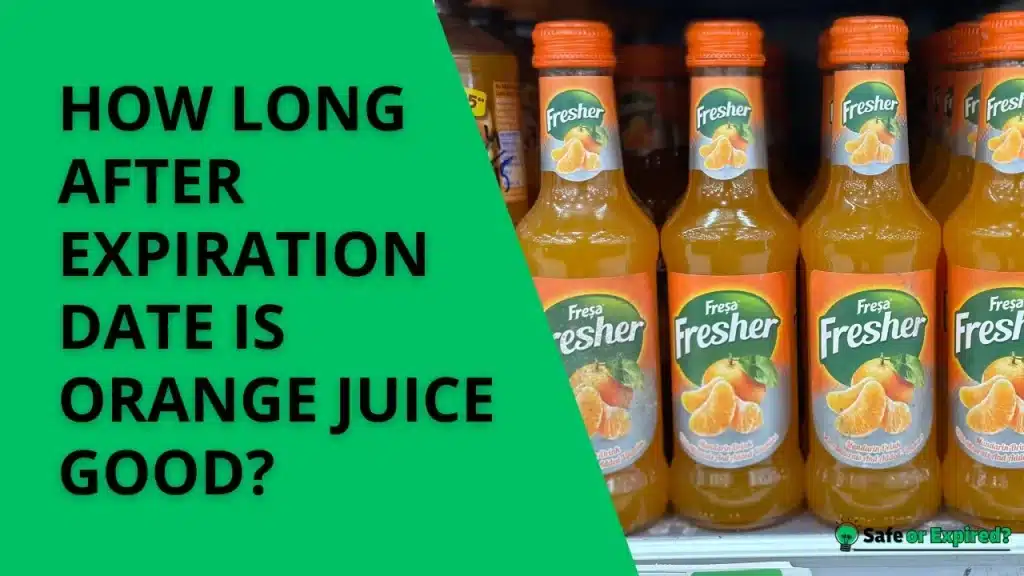“How long after expiration date is orange juice good?” is a common concern for those monitoring their food safety. You might be surprised to know that orange juice can stay good for up to 10 days after expiry. However, the exact time can vary, and you will learn everything in this guide.
Stay tuned as we squeeze out all the facts about orange juice’s shelf life and give you tips to ensure you’re drinking the freshest juice possible!
How Long After Expiration Date Is Orange Juice Good?
Typically, orange juice can be safe to drink up to 7-10 days after the expiration date if it has been stored correctly in the refrigerator. However, it is crucial to check for spoilage signs such as off smell, taste, or appearance before consumption. Also, note that the expiration date is printed on the cap, bottle, or packaging.

People often ask, “How long is Simply Orange juice good for after expiration date?” Simply Orange juice can generally remain consumable for 7-10 days past its expiration date when kept refrigerated and unopened. Once opened, it is best to drink it within seven days, regardless of the sell-by date, to ensure quality and safety.
You may also want to know, “How long is Minute Maid orange juice good for after the expiration date?” Minute Maid orange juice, if unopened and refrigerated, is typically safe to consume up to 10 days after the expiration date. Like other brands, ensure that the juice does not show any signs of spoilage before drinking.
Factors That Decide the Shelf Life of Orange Juice
The shelf life of orange juice after its expiration date depends on several key factors:
- Storage Conditions: Orange juice should be stored in the refrigerator and kept tightly sealed. Exposure to high temperatures or fluctuations can accelerate spoilage.
- Type of Packaging: Aseptically packaged juice (not requiring refrigeration before opening) generally lasts longer than juice in traditional containers.
- Preservatives: Juices with added preservatives may last longer than organic or preservative-free options.
- Opening: Once opened, exposure to air can introduce bacteria and yeast, speeding up the degradation process.
- Processing Method: Pasteurized juices have a longer shelf life compared to unpasteurized or freshly squeezed juices due to the elimination of microbes during pasteurization.
These factors must be considered to ensure the safety and quality of orange juice after its expiration date. Always inspect the juice for any signs of spoilage before consumption. If you spot any, then note that you won’t enjoy the nutritional benefits of the orange juice. You can find the nutritional content on the bottle:

Now, let’s look at some popular orange juice shelf life queries.
Does Orange Juice Go Bad if Not Opened?
Unopened orange juice can last well beyond the expiration date if stored appropriately in a cool, dark place. Typically, commercially packaged orange juice remains safe to drink for 2-3 weeks past the date printed on the carton, assuming it has not been exposed to high temperatures.

How Long Does Orange Juice Last Unrefrigerated?
Orange juice should not be left unrefrigerated for more than 2 hours as it is prone to bacterial growth. If stored at room temperature for a few hours, it’s best to consume it immediately; otherwise, it’s safer to discard it to avoid the risk of foodborne germs.
How Long Does Fresh Orange Juice Last in the Fridge?
Freshly squeezed orange juice, when refrigerated, is best consumed within 2-3 days to ensure optimum freshness and safety. Because it lacks preservatives and pasteurization, it is more prone to bacterial growth and spoilage.
How Long Is Orange Juice Good for Once Opened?
Once opened, orange juice should be kept refrigerated and consumed within seven days, regardless of its initial shelf life or expiration date. After opening, exposure to air and bacteria accelerates spoilage, making it important to consume it within this timeframe for the best quality and safety.
Here’s a table detailing how long orange juice typically lasts under different conditions:
| Storage Condition | Opened | Unopened |
| Counter | Not recommended (consume immediately if left out more than 2 hours) | Not recommended (consume immediately if left out more than 2 hours) |
| Fridge | 7 days | Up to 2-3 weeks past expiration date (commercially packaged) |
How to Know Orange Juice Has Gone Bad? Signs to Check
To determine if orange juice has gone bad, check for spoilage, like changes in color, smell, and taste. Spoiled juice often turns darker, emits a sour or fermented odor, and tastes unusually sour or vinegary. Always inspect these aspects before drinking to avoid consuming spoiled orange juice.
Change in Color
When orange juice spoils, one of the first noticeable signs is a change in color. Fresh orange juice has a vibrant, bright orange color. As it begins to spoil, the color may darken or turn somewhat brownish.
This discoloration is due to the oxidation process and the growth of microorganisms such as mold or yeast. If you notice any changes in color from its original bright orange shade to a darker, duller hue, it’s a strong indication that the orange juice is no longer good to drink.
This change can also be accompanied by the separation of liquid components, where the water separates from the rest of the ingredients.
Unpleasant Smell
A key indicator that orange juice has gone bad is an unpleasant smell. Fresh orange juice should smell sweet and citrusy. If your orange juice starts to smell sour, fermented, or just generally off, it’s a sign that it has likely spoiled.
This sour smell is caused by the fermentation process, where bacteria and yeast break down the sugars in the juice into alcohol and other compounds. The presence of these microbes not only alters the aroma but can also lead to potential health risks if consumed.
If your orange juice doesn’t smell like fresh oranges, it’s best to err on the side of caution and discard it.
Off Taste
Spoiled orange juice will have a noticeably bad taste. Instead of the sweet, refreshing flavor you expect from orange juice, spoiled juice may taste sour, bitter, or metallic. This off-taste is a direct result of the acids and other compounds produced by bacteria and yeast during the spoilage process.
Drinking juice that tastes off can be an unpleasant experience and may pose health risks, such as food poisoning. To avoid any issues, if the taste of your orange juice isn’t what you’re used to or if it makes you grimace, it’s safest to throw it out.
Now, you can ensure that you enjoy your orange juice while it’s fresh and avoid the discomfort and health issues associated with spoiled beverages. Always check your juice before drinking, especially if it’s been stored for a while or if the storage conditions are less than ideal.
What Happens if You Drink Expired Orange Juice?
When you drink orange juice that has passed its expiration date, several things can occur depending on the level of spoilage. If the juice has just recently expired and has been stored properly, it might still be safe to drink.
However, if the juice shows signs of spoilage like a bad smell, taste, or appearance, drinking it can cause symptoms such as:
- Stomach discomfort: You might experience mild to severe stomach ache.
- Nausea and vomiting: Spoiled juice can cause you to feel nauseous or even vomit.
- Diarrhea: Consuming spoiled substances often leads to diarrhea as your body tries to rid itself of the offending substance.
These symptoms are generally not severe but can be quite uncomfortable. They usually resolve on their own without the need for medical intervention.
Can Expired Orange Juice Kill You?
It’s highly unlikely that expired orange juice would be fatal. However, in extreme cases where harmful bacteria like Salmonella or E. coli have contaminated the juice (which is more likely if the juice was improperly handled or stored), there could be more severe health consequences.
Such infections can lead to more serious conditions, especially in young children, the elderly, or those with weakened immune systems. In these cases, medical treatment is necessary.
To avoid these risks, always check your orange juice for signs of spoilage before consumption and store it according to the manufacturer’s instructions. When in doubt, it’s safer to discard any juice that you suspect may be spoiled.
Remember that the right techniques can extend the shelf life of your groceries. Check out our “Top Tips for Food Storage and Preservation” for practical advice.
What To Do if You Drink Spoiled Orange Juice?
If you accidentally consume spoiled orange juice, it’s important to monitor your symptoms. Most cases result in mild effects like stomach discomfort, which typically resolve on their own. Stay hydrated and avoid heavy foods.
Monitor Symptoms
After drinking spoiled orange juice, the first thing to do is monitor how you feel. Common symptoms include stomach pain and diarrhea. These symptoms usually aren’t severe and can last from a few hours to a day.
It’s important to pay attention to how your body is reacting. If you just feel a little upset in the stomach, chances are it will pass. However, if the symptoms escalate or you start feeling extremely sick, it’s a signal that you might need more care.
Stay Hydrated
One of the risks of vomiting and diarrhea is dehydration, which can occur quickly, especially in children and older adults. To counteract this, drink plenty of fluids. Water is best, but electrolyte solutions or sports drinks can also help restore the necessary balance of salts and sugars in your body.
Rest Your Stomach
If you’ve consumed spoiled orange juice, it’s wise to give your stomach a break. This means avoiding heavy, greasy, or very spicy foods until your stomach settles. Stick to bland, easy-to-digest foods like toast, rice, bananas, and applesauce at first.
Seek Medical Attention If Necessary
If symptoms are severe or don’t improve within 24 hours, seek medical attention. This is particularly important for young children, as they are more vulnerable to the effects of foodborne illnesses.
Medical professionals can provide treatments such as rehydration solutions, medication to manage symptoms, and, in some cases, antibiotics if a bacterial infection is suspected. Always err on the side of caution and keep consulting with a healthcare provider.
Taking these steps can help manage any adverse effects from drinking spoiled orange juice, ensuring that you or anyone affected can recover quickly and safely.
Now, you know that good food should be both enjoyable and safe. Find out how to maintain this balance in “Balancing Food Quality and Safety for Better Health.”
Best Ways to Keep Orange Juice Fresh for a Long Time
To keep orange juice fresh, store it in the refrigerator immediately after use, keep it tightly sealed in a container, and avoid direct exposure to light. These practices help maintain its flavor and nutritional quality for a longer period.
Refrigerate Immediately
Always refrigerate orange juice as soon as you finish pouring what you need. The cold environment of the fridge slows down the growth of bacteria and the rate of oxidation that can spoil the juice. Whether it’s freshly squeezed or store-bought, keeping the juice cold is crucial for preserving its freshness and extending its shelf life.

Ideally, the refrigerator temperature should be set below 40°F (4°C), which is the recommended temperature to inhibit bacterial growth and ensure that the juice remains refreshing and safe to drink.
Use Airtight Containers
Store orange juice in airtight containers to minimize its exposure to air. Air can introduce bacteria and other contaminants and can also speed up the oxidation process, which degrades the quality of the juice.
By using airtight containers, such as glass or plastic jugs with tight-fitting lids, you effectively seal out the air, keeping the juice fresher for longer. If you’ve opened a store-bought juice, consider transferring it to a smaller container if the original package is too large, which helps reduce the air space surrounding the juice inside the container.
Avoid Light Exposure
Keep orange juice out of direct light, whether from the sun or kitchen lights. Light can trigger photo-oxidation, a process that not only deteriorates the quality of the juice by breaking down vitamins and altering flavors but can also lead to spoilage.
Store your juice in opaque or dark-colored containers if possible, or place it in a part of the refrigerator that is not directly exposed to light. This simple step can significantly enhance the longevity and taste of your orange juice.
Keep It Sealed Tightly
Ensure the container holding the orange juice is sealed tightly after each use. This prevents air from getting into the container and further protects against contamination and spoilage.
Tight sealing helps maintain the integrity of the juice’s flavor and nutritional content by reducing the influx of bacteria and limiting oxidation. Each time you pour yourself a glass, make sure to close the container as tightly as possible.
By following these tips, you can maximize the shelf life and quality of your orange juice, making every glass as delicious and nutritious as possible.
Also, safe food handling is vital for your health. Get updated on the best practices from leading authorities in “Key Guidelines for Food Safety from Top Institutions.”
Conclusion
To wrap up, orange juice is usually safe for 7 to 10 days after the expiry. Here are the key points to remember:
- Always inspect the juice: Check for changes in color, smell, and taste before consuming.
- Storage is crucial: Proper refrigeration and sealing can extend the freshness of your juice.
- Know the risks: Drinking spoiled juice can lead to stomach discomfort and other health issues.
- Freshness varies: Store-bought juice typically lasts longer than freshly squeezed due to pasteurization and preservatives.
- When in doubt, throw it out: If the juice exhibits any signs of spoilage, it’s safer to discard it.
Now you can make better decisions about consuming orange juice past its expiration date, ensuring safety and enjoyment with every glass.

